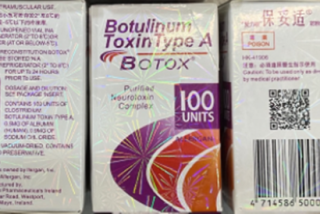Complications Feared if Rush to Botox Occurs
Now that Botox has received U.S. approval as an anti-wrinkle treatment, doctors already are warning that an expected promotional blitz will likely send many image-conscious Americans flocking for treatment to inexperienced health professionals, resulting in potentially dangerous complications.
Approval by the Food and Drug Administration will give consumers more confidence about the safety of the procedure, doctors said, and the product’s manufacturer, Irvine-based Allergan, has announced plans for a $50-million advertising campaign to raise awareness and boost sales. Moreover, experts anticipate a flurry of advertising and fierce price competition among dermatologists and other doctors, similar to the laser eye-surgery boom that began in the mid-1990s.
“This will convince a lot of people who’ve never touched [Botox] before that it’s OK to use,” said Dr. Richard G. Glogau, a clinical professor of dermatology at UC San Francisco, who has used botulinum toxin type A, or Botox, in his practice for eight years. “But we’re going to see all sorts of strange aesthetic outcomes when these procedures are performed by physicians who haven’t done them before.”
Of course, plastic surgeons, dermatologists and ophthalmologists have been using Botox, which was approved by the FDA in 1989 to treat eye-muscle disorders, as a quick fix for wrinkles for years. Federal law allows doctors some discretion to use drugs for unapproved--or “off label”--uses. More than 855,000 Americans got Botox injections last year, according to the American Society of Plastic Surgeons, making it the most popular nonsurgical cosmetic procedure. Costs for the treatment vary, but the average is put at about $400.
If demand spikes, as anticipated, some experts fear it will spawn a gold rush mentality among the nation’s doctors. “This is pure manna from heaven, and every Tom, Dick and Harry with a medical degree is going to be doing this,” said Dr. Mark Gorney, medical director of the Doctors’ Company, a large medical liability insurer in Napa. “There’s an enormous potential for abuse.”
Already, there have been reports about Botox “parties,” where doctors give groups of patients shots for reduced fees, sometimes with cookies and champagne. “This smacks of a cavalier attitude, which flies in the face of common medical sense,” says Dr. Edward Luce, president of the American Society of Plastic Surgeons and chief of plastic surgery at University Hospital in Cleveland. “And what will happen in the future when anybody with a syringe and Botox starts injecting this?”
Still, Botox, which is derived from a diluted form of the toxin that causes botulism, a potentially fatal form of food poisoning, is considered quite safe for its current cosmetic use. Yet botulinum, in its full-strength, poisonous form, is considered so dangerous that it is ranked as a potential biological weapon, on the same list as anthrax and smallpox. An Allergan spokeswoman said last week that the company is producing Botox at a factory in Ireland and added that safety guidelines are being followed.
Botox works by paralyzing facial muscles, such as furrows between the eyebrows, frown lines and forehead wrinkles, and ironing out these creases. Those effects last only three to six months.
Yet the procedure isn’t risk-free. Side effects include face pain, nausea, flu-like symptoms and, in rare instances, excruciating headaches. And overuse of Botox injections can result in the loss of facial expression, creating a mask-like appearance. Perhaps worse, an injection into the wrong muscles can cause droopy eyelids, asymmetric smiles or even drooling.
With 44 muscles in the face, the musculature is quite intricate, said Glogau.
“Very few people in medicine really know facial anatomy well,” he said. “These injections have to be precisely placed--it’s not like hitting your rear end.”
Others believe, however, that physicians will behave responsibly. “Doctors wouldn’t allow nurses to do these injections if they weren’t trained, or confident they were competent,” said Janette Wackerly, a nursing education consultant with the California Board of Registered Nursing in Sacramento.
Medical experts urge consumers to seek out a doctor with a lot of experience--and not to be afraid to ask about their background. “There can be a steep learning curve,” said Dr. James H. Wells, a Long Beach plastic surgeon and president of the California Society of Plastic Surgeons.
“This isn’t something that should be done on impulse--take the time to find a physician who knows what he or she is doing to get the best results.”






